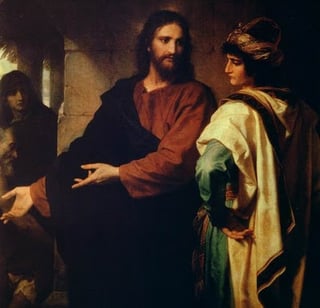"Did Jesus mean what he said?" This is the question a high-powered, well-to-do, Catholic lawyer named Dale Recinella asked his wife the day they signed their contract for their spacious, new dream home.
The Holy Spirit had nicked his conscience that morning at Mass with the following reading, Mark 10:17-25:
As Jesus started on his way, a man ran up to him and fell on his knees before him. "Good teacher," he asked, "what must I do to inherit eternal life?" "'Why do you call me good?" Jesus answered. "No one is good-except God alone. You know the commandments: 'Do not murder, do not commit adultery, do not steal, do not give false testimony, do not defraud, honor your father and mother.' " "Teacher," he declared, "all these I have kept since I was a boy." Jesus looked at him and loved him. "One thing you lack," he said. "Go, sell everything you have and give to the poor, and you will have treasure in heaven. Then come, follow me." At this the man's face fell. He went away sad, because he had great wealth. Jesus looked around and said to his disciples, "How hard it is for the rich to enter the kingdom of God!" The disciples were amazed at his words. But Jesus said again, "Children, how hard it is to enter the kingdom of God! It is easier for a camel to go through the eye of a needle than for a rich man to enter the kingdom of God."
Dale asked again, "And so the question is, did Jesus mean what he said?"
His wife, Susan, a Catholic therapist, looked up at him pensively, leaving her fork and her words in midair.
"I don't know. I've never heard anyone discuss it."
"Me neither."
"Maybe we should find out."
Shortly after that, Dale had a terrifying, realistic dream, which left him in a puddle of agonizing tears. He is outside raking leaves and hears the most beautiful angelic voice beckoning him to the come towards the stunning light of a setting sun. Everything in his entire being wants to run towards it; yet he can't. His ankle is chained to his new house, representing his material wealth and his attachment to it. In the dream, he would chop his leg in two, rip it off like a mad dog, anything to not be deprived of the light. But to his horror, he cannot. He describes what happens next:
"I try to pry the chain out of the wall. I even try to pull the whole blasted house behind me. But it is futile. As I stand there trembling and weeping, the voice fades, the sun sets, and finally, it is completely dark. The voice is gone. The cold is absolute. In the dream, I know that there will be no second chance. I have lost it forever. I scream and wake up." (Now I Walk on Death Row, pp. 92-93)
After his prophetic dream, which came in answer to his and his wife's question, Dale moved from the uncomfortable fear that Jesus may have meant what he said in general, to the shock of thinking that he may have meant it for him and his wife and family personally.
Those of us who are Christians know that the Gospel is not a series of historical events or moral teachings. It is a living text. The words that Jesus spoke to this young man and to his disciples were also intended for you and me right here and now in the 21st century.
Like Dale, we might consider asking ourselves the same question, "Did Jesus mean what he said?" Is wealth a possible impediment to my entry into the Kingdom of God? Is Jesus speaking to me?
I rarely consider wealth to be one of my impediments to God, yet I live in one of the wealthiest countries in the history of the world. We tend to agree that materialism is a sin, but we almost never bring that sin to the Sacrament of Reconciliation—we aren't confessing it. We are taking it to our graves. This is understandable given our fallen human nature, for when we have lovely things and plenty of money, it is very hard for us to give them up. Even little kids hate the thought of sharing.
When we respond to God's grace and go through the agonizing work of dying to ourselves, when we unselfishly let go, we are able to respond freely to Jesus' call to follow him. This means living simply without luxury and giving what we don't actually need to the poor. Then we are free to enter Paradise without chains attached to the world. A hearse is never followed by a U-Haul. Wealth becomes an impediment to our connection with heaven when our private possessions (money, lovely material possessions, nice house, nice car, big bank account, etc.) have greater value to us than our relationship with God and others. The above passage from the Gospel of Mark has the power to change the face of the earth, if we are willing to listen to what Jesus might be saying to us.
Jesus simply wants us to ask him this with an open and obedient heart: "What do you want me to do with my money? What to do you want me to do with my things?"
St. Ignatius of Loyola, the preeminent teacher in the Catholic Church on spiritual discernment wrote in his Spiritual Exercises: “The other things on the face of the earth are created for human beings, to help them in the pursuit of the end for which they are created. From this it follows that we ought to use these things to the extent that they help us toward our end, and free ourselves from them to the extent that they hinder us from it.”
In article 2446, The Catechism of the Catholic Church quotes these words from St. John Chrysostom: “Not to enable the poor to share in our goods is to steal from them and deprive them of life. The goods we possess are not ours, but theirs.” “The demands of justice must be satisfied first of all; that which is already due in justice is not to be offered as a gift of charity.”
When we come face to face with Our Lord at our personal judgment at death, Jesus will ask all of us, "What did you do with the resources I gave you?"
Many of us never ask what Jesus wants at all, because we fear his answer. We buy what we want, earn what we can, without ever checking in with the Almighty regarding the soul-saving concept of God versus mammon (money). When we contemplate giving up a substantial amount of our money or giving up some of our things to help the poor, we can get hit by an irrational fear of entering into poverty, misery, and woe ourselves. We can forget that God knows very well that we need money and things to live. As Jesus tells us in Matthew 6: 31-33, "So do not worry and say, 'What are we to eat?' or 'What are we to drink?' or 'What are we to wear?' All these things the pagans seek. Your heavenly Father knows that you need them all. But seek first the kingdom (of God) and his righteousness, and all these things will be given you besides."
When we give abundantly and live more simply, we are sustained providentially by God's loving hand because he wants to help us to continue to give. But we lack trust. Somehow we erroneously think that God doesn't know how to take care of us, if we follow his will.
At the end of our lives, we will stand before the stark truth and see plainly what God intended for us to do with the money and resources we had at our disposal. For that day to be a joyous one, I HIGHLY RECOMMEND WATCHING THIS SHORT MUSIC VIDEO BY SARAH McLACHLAN CALLED "WORLD ON FIRE". The song will be a welcome break from your day, and the video conveys the essence of this article much better than my words.
So what happened to Dale Recinella and his wife, Susan, when they asked themselves, "Did Jesus mean what he said?"
Their entire lives changed. To read what happened to them, I recommend Mr. Recinella's fantastic book: Now I Walk on Death Row.
The answer was, "Yes."
Copyright 2013 Christine Watkins
About the Author

Christine Watkins
Christine Watkins, inspirational speaker and author, was saved from death and atheism, through a miracle of divine grace. She is the founder of QueenOfPeaceMedia.com, the author of TRANSFIGURED: Patricia Sandoval's Escape from Drugs, Homelessness, and the Back Doors of Planned Parenthood and Full of Grace: Miraculous Stories of Healing and Conversion through Mary’s Intercession. See ChristineWatkins.com, and visit QueenOfPeaceMedia.com.



.png?width=1806&height=731&name=CatholicMom_hcfm_logo1_pos_871c_2728c%20(002).png)
Comments